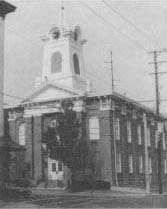
THE SURGEON

In the vestibule of the courthouse the surgeon could not spare a hand to mop away the sweat on his face or the tears that kept running down his cheeks. The tears were partly from exhaustion and partly from the perpetual anguish of caring for an endless succession of mangled men.
Now his left hand held the forceps clamped on the severed end of an artery, and with his right he was trying to tie the ligature. His steward reached out to help, but his clumsy fingers grazed the forceps and the artery slipped back out of sight.
The woman was the last straw. When a shadow eclipsed the sunlight from the open door, the surgeon glanced around and saw her, then looked back angrily at the mess on the table, the wreck of a boy no older than fifteen.
He pitied these women, but he was sick of them, sick to death of their doleful questions, their weeping, their habit of swooning at the sight of a gangrenous leg. And then, of course, he had to stop whatever he was doing and take care of them first.
This one was obviously in a family way. She’d be more trouble than all the rest. In a minute she’d keel over when she caught sight of the basket under the stairs, or faint away from the smell of ether and chloroform and the reek of suppurating wounds combined with the general town stench of the dead horses that hadn’t been buried yet.
Or maybe the wretched mother-to-be would venture past him into the courtroom, where hundreds of men lay naked on the bare floor with nothing but newspapers to keep off the flies. Even out here with the door shut, she could hear their whimpering cries.
The surgeon did not turn around again. He checked the tourniquet, tightened it a little, made another attempt to tie the ligature, succeeded, picked up his instrument, judged the line his saw would take—it was a single-flap amputation—and got to work.
But his strength was draining away, the nervous energy that had kept him going day after day when he had hardly paused for food, only sipping a little whiskey now and then, managing only a few hours of sleep, falling like a dead man on a horsehair settee in the judge’s private chamber, now cluttered with waiting coffins.
He did not look at the woman, but knowing that she was there, he edged sideways to hide the back-and-forth movement of the tool in his hand. No doubt she could guess what was going on. She could see his right elbow driving back and forth and hear the brittle rasp of the saw. Any moment now she’d crumple to the floor and give birth.
Still she uttered no sound. When the last shred of skin was cut through and the severed leg tossed into the basket, he left the task of dressing the stump to his steward and turned around to glower at the woman.
She was deathly pale, but still standing. “Sir,” she said quickly, seizing the moment, “I’ve come to Gettysburg to find my husband. His name’s Seth Morgan. He’s a first lieutenant in the Second Massachusetts. No one seems to know where he is. I tried to find Colonel Mudge, but they told me he was killed at a place called Culp’s Hill.”
“Oh, yes,” said the doctor, who had received some of the wounded from that criminally stupid attack. His grim look softened. “There must have been a muster after the battle,” he said kindly. “Do you know who took Colonel Mudge’s place? Surely someone will have a list.”
The boy on the table whimpered, and the surgeon spoke testily to the steward, “Keep it up, keep it up.” Obediently the young man dripped more ether on the cloth over the soldier’s face.
“Oh, yes, there was a list in the paper, the Philadelphia paper. I saw it, the casualties for the Twelfth Corps, and my husband was listed as missing. And I met a corporal in his company just now, but he hadn’t seen Seth since the fighting. I’m not sure, but I think that’s what he said. I believe the corporal wasn’t very well.”
Drunk, guessed the surgeon. “Well, of course the roster of the wounded isn’t complete yet.” He looked at her doubtfully. “If your husband was wounded, you might find him in the hospital for the Twelfth Corps. You see, they sort them out by corps.”
“Where?” she said quickly. “Tell me where to go.”
For a moment he considered, looking at her silently. “Are you sure? Perhaps it would not be wise for a woman in your—”
“Where is it? Tell me.” Then she had to stand aside because the next case was coming in, slung in a blanket between two young women.
Carefully they rolled the new patient onto the table. It was a head wound this time. The boy’s face was flushed with fever. He was thrashing from side to side.
With relief the surgeon dismissed the woman. “I believe the Twelfth Corps hospital is in a barn somewhere south of town.”
She said something, probably “Thank you,” and he heard the swish of her skirt against the frame of the door.
The poor woman is in for a shock, thought the surgeon, handing the can of ether to the steward. If her husband’s name was not on the muster roll of dead and wounded after the fracas at Culp’s Hill, and if he hadn’t been seen since the battle, most likely he was a deserter.
The surgeon grimaced at Sally and Sarah. “Go on home, you two. William and I’ll get along first-rate.”
Sally folded the blanket and shook her head. Sarah said softly, “Sir, I’m afraid there’s two more have died.”